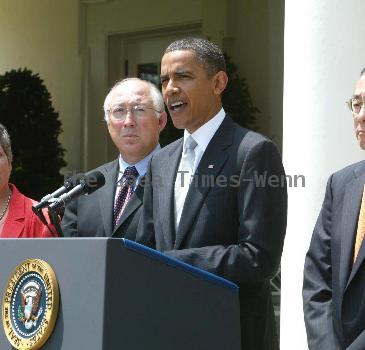Lights, cameras, action: Congressional panels rush to probe oil spill, curry favor with voters
By Tom Raum, APSaturday, May 22, 2010
Gulf oil disaster brings gusher of Hill hearings
WASHINGTON — The month-old oil disaster in the Gulf of Mexico has unleashed a gusher of congressional hearings that may prove nearly as hard to cap as the blown BP well.
In an election year rife with political posturing, the spill from the April 20 explosion on the Deepwater Horizon rig is proving an easy target for lawmakers, whose fears of being swept out of office by an anti-incumbent wave were reinforced by Tuesday’s batch of primaries.
The blowout and the ensuing giant oil leak gave rise to 10 congressional hearings over the past two weeks. Five more are scheduled for this coming week, and at least five more are on tap in June. President Barack Obama is naming a special independent commission to review the accident.
Blame-trading oil industry executives, along with government regulators, prominent scientists and environmentalists crossed paths on Capitol Hill as they scurried from one hearing to the next.
There’s even an element of Hollywood. Having spent $24 million on developing a centrifuge device to drop into a slick to separate water from oil, actor Kevin Costner has been in New Orleans hoping to sell BP on the idea. Can it be long before he’s invited to Washington to testify?
In many ways, the frenzy resembles last year’s multiple congressional inquiries into the causes of the 2008 financial meltdown or the taxpayer bailouts for GM and Chrysler. Or this year’s hearings on Toyota, Goldman Sachs and Lehman Brothers.
“It’s about evenly divided between stagecraft and statecraft. They have a job to do. They’re showing constituents they ‘get it’ in a year when many voters think they don’t,” said Larry Sabato, a University of Virginia political scientist and the author of books on political “feeding frenzies.”
“A lot of it is just for show. You rake the bank executives or the BP bosses over the coals. And everybody gets outraged and feels better.”
Sen. David Vitter of Louisiana used the weekly Republican radio address on Saturday to take aim at Democratic committee chairmen who he said “have rushed to create media events for television cameras instead of devoting full attention to stopping the immediate problem. … The time for committee hearings is for after the well has been capped — not before.”
Grandstanding, however, was not limited to a single party.
For all the political theater, the hearings have provided little new information or shed much light on the causes of the explosion or the true extent of the danger to the environment.
It’s mostly an opportunity to rant and rave, some congressional aides acknowledge. The same lawmakers responsible for keeping an eye on things are now conducting the hearings into what went wrong — and trying to avoid blame themselves.
Some ranters have been grateful recipients of energy industry largesse when it comes to campaign contributions.
At hearing after hearing, executives of companies that owned and operated the oil rig pointed fingers at each other. Leading Republicans accused Obama administration regulators of being asleep at the switch.
When Interior Secretary Ken Salazar said his agency could have more aggressively monitored the offshore drilling industry, Republicans immediately jumped. Rep. John Mica, R-Fla., offered an “Obama oil spill timeline” and said the administration wrote a “carte blanche” check for disaster by approving drilling permits for dozens of wells, including BP’s from the Deepwater Horizon rig.
Rep. Edward J. Markey, D-Mass., demanded that BP post on its website a live stream of video from the oil leak. BP met him half way. It wouldn’t put it on its own website, but made it available for posting on the website of Markey’s committee, the House Energy Independence and Global Warming Committee.
Marine biologist Sylvia Earle, the National Geographic Society’s explorer in residence, told a House panel, “I really come to speak for the ocean.”
“We are pointing anywhere we can for blame. But actually, the blame of this and other catastrophes were costs related to our demand for cheap energy. (It) is something that all of us need to bear. We all must share the cost of those who demand cheap oil at any price,” she said.
Rep. James Oberstar, D-Minn., chairman of the House Transportation and Infrastructure Committee, told Earle her passionate testimony on behalf of the ocean — or in this case the Gulf — reminded him of poet Lord Byron’s description of the seas as “dark-heaving; boundless, endless and sublime.”
And he scolded Republicans for calling it the “Obama oil spill.”
Obama engaged in a flurry of activity himself, not wanting to be accused of hesitation and missteps, as President George W. Bush was for his response to Hurricane Katrina.
Obama slammed oil executives for a “ridiculous spectacle” of publicly trading blame, criticized Senate Republicans for blocking debate on a bill to lift the liability cap on oil companies for oil-spill related damages, and drew up plans for a blue-ribbon commission to investigate the spill.
Online:
House Energy Independence and Global Warming Committee: globalwarming.house.gov/
Tags: Accidents, Barack Obama, Energy, Environmental Concerns, Government Regulations, Industry Regulation, Legislature Hearings, North America, Oil spill, United States, Washington



